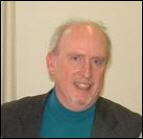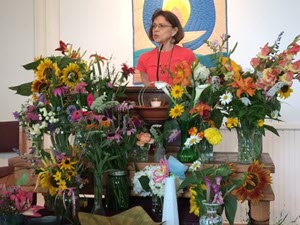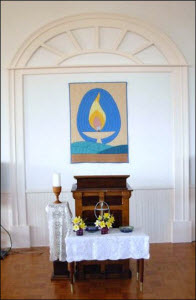
HUU Sermon Archives
On Time
by J. Barkley Rosser, Jr.
Leap Day, February 29, 2004
 Oh,
to be on time, all the time,
Oh,
to be on time, all the time,
Never to be late, of so great,
I can't wait, go on out the gate,
Bells will chime, with reason or rhyme.
Some say time is a river,
Flowing as we go to light or dark,
We know not where it will deliver,
But I hope there'll be a place to park.
It leads our lives to uncoil,
It goes on and on no matter what we do,
It leads our spirits to a boil,
Until we no longer know who is who.
Some say time is an arrow,
Fleeting on and on it zooms,
Taking us in a great wheel barrow,
From big bang to endless glooms.
Perhaps light is its master,
Controlling the aging with velocity,
It moves slower as we go faster,
But to beat light we have no capacity.
Ah, to step out of time is to see the light,
So say the enlightened without illusion,
But to avoid going into the night,
This would be a delusion.
It is intentional that the title of this talk has a double meaning, both to be about time itself and also to be about being “on time” in the social sense. I shall deal with both of these aspects, moving from the more general about time itself in its physical cosmic sense through the more social aspect of the meaning of time and being on time finally to the more personal perspective on time.
Beginning with the more cosmic physical aspect, we must face a deep mystery: time as an arrow. It seems to go in only one direction, from past into the future, or alternatively, as reality happens past accumulates but we are unable to go into the past to redo it (the latest scientific speculations suggest that if one were to go into the past one would go into a second time dimension into an alternative universe). That this unidirectional nature of time is mysterious shows itself in the Newtonian and Einsteinian equations of motion (explaining what happens through time): the sign of time is indeterminate: in principle time could go backwards as easily as forwards. But it only seems to go one way.
There has been much speculation regarding this. One explanation has been to tie this to the Second Law of Thermodynamics, also known as the Law of Entropy, that in a closed system energy dissipates eventually to a uniform randomness. This is the story of the universe as a whole, as is currently thought, a long movement from the big bang to a cosmic formlessness and dissipation trillions of years from now. The physicist, Erwin Schrödinger hypothesized that life itself is an anti-entropic process, a temporary building up of order by open systems that accumulate matter and energy. We battle against entropy, against time's arrow in our own little ways, as we live. But in the end entropy gets us and we die and dissipate as our bodies return to the mother earth.
Another issue arising from physics about time is the point made by Einstein that time is relative not absolute. The older view was that time and space were distinct and absolute, time happening everywhere simultaneously in the same way throughout a uniform, three-dimensional space. Now we understand that both are integrally a single thing, spacetime, which can appear to be different from different perspectives in relative motion. If one accelerates away from someone else, one appears to move more slowly in time from the perspective of the one who does not accelerate. This is the unavoidable logical consequence of the universal constancy of the speed of light. We are each our own little centers of the universe, bases for coordinate systems for measuring spacetime, although I do not wish to encourage extreme selfishness or lapses into solipsism by this observation. But no matter where we are or how we are moving relative to others, all light going by us in any direction will appear to travel at the same speed. It is to bring this constancy about that our relative perceptions of spacetime must become fungible and relative in regard to each other. However, we do not see this as a problem in our local relations on earth as we are not moving rapidly enough relative to each other for these variations in the perception of time to become particularly noticeable.
Thus on earth we have been able to socially construct universal systems of time keeping with which we have been able to order our social interactions and existences. How do we know when to do things, to meet with each other on time? It is through these socially constructed systems of time keeping. The oldest and arguably most important have been our calendar systems, which are profoundly fundamental organizing principles of societies. Many such have been constructed around the world, although we shall focus our attention on those coming out of the Middle East and Europe.
The oldest reflect agricultural societies where time did not need to be known with exact certitude. These were solar-based and emphasized the critical turning points of the solar year, especially the solstices and the equinoxes. This can be seen at Stonehenge, one of the oldest calendrical sites, where the heel stone indicates the location of the sunrise on the summer solstice. Agricultural societies tend to have a more cyclical or circular view of time, and it is not so important to be exactly on time according to some arbitrary clock. Time depends on natural conditions, which may vary from year to year. Thus even now in southern Wisconsin, farmers will say that corn should be planted in the spring, “when the oak leaves reach the size of a squirrel's ear,” a moment that does not arrive at the same time each year according to more precise calendars. But the solstices and equinoxes nevertheless remain important reference points.
Among our oldest calendars are the Persian/Zoroastrian and the astrological, both of which begin on the vernal equinox. In Persian-influenced cultures though Central Asia this calendar has continued to be followed, with its new year, Nowruz, a major holiday. This was long the case in Afghanistan until the Taliban took over who viewed this as a pagan holiday and banned the celebration of it, replacing the Persian calendar with the strictly lunar hegira calendar of Islam. With the overthrow of the Taliban, people in Afghanistan were pleased to be able to celebrate Nowruz openly again (the most widely celebrated official holiday in the world is January 1, the new year of the Gregorian solar calendar).
There has long been a struggle over how to integrate solar and lunar aspects of calendars. Most try to reach a compromise, define the year on a solar basis but the months (“moons”) on a lunar basis. Unfortunately they do not add up neatly. Thus the strictly lunar hegira Islamic calendar has the year simply consisting of twelve months, each of which is literally a moon, with each beginning with the sighting of the new moon, which has traditionally allowed a bit of fuzziness in that calendar. By being shorter than the solar year by ten to eleven days, the years slip by more quickly, and we are now near the end of hegira 1424, even though year 1 of that calendar was in 622 C.E. of the Gregorian calendar (1382 solar years ago). The Hebrew calendar involves a complicated system whereby the year is defined by both solar and lunar elements, with Rosh Hoshannah, the new year, moving around somewhat from year to year in terms of Gregorian calendar dates, although not systematically drifting forwards as does the new year of the hegira Islamic calendar.
The most important calendars have been the European solar year calendars, with the first being the Julian one, established by the Roman emperor, Julius Caesar. It gave us twelve months that are somewhat longer than a true moon, and the curious concept of the leap year with its extra leap day, February 29, as the year is about 325 ¼ days long rather than exactly 325. However, problems arose because it is a little bit less than 325 ¼ days long, although it would take more than a millennium before anybody would notice this discrepancy sufficiently to become bothered about it.
The party that was most concerned with such matters was the Church, more specifically the Roman Catholic Church. The issue was the date of Easter. On strictly biblical grounds that should have coincided with the Hebrew Passover (Pesach). But in fact the dating of Easter had been a matter of great contention and ultimately involved a compromise with various moon and equinox worshiping pagan sects, with the date for Easter being the first Sunday after the first full moon after the vernal equinox. Needless to say after about 1,000 years it was becoming obvious that Easter was often happening way too long after the vernal equinox. So, in 1582 Pope Gregory XIII set to make things right by altering the calendar, giving us our modern widely used calendar named for him. Thirteen days were removed and the system was adjusted so that there would be no Leap Year on centuries that were not divisible by 400 (so there was no February 29 in 1800 or 1900 nor will be in 2100, but there was one in 2000). The eastern Orthodox rejected this move and so today their December 25 is on the Gregorian January 7, the date for the Orthodox Christmas. For those who know their Soviet history, the parades in Red Square under the Communists on November 7 celebrated the “Great October Socialist Revolution,” as that date prior to the Bolsheviks adopting the Gregorian calendar had been October 25 following the Julian calendar of the Orthodox Church.
In Protestant England, also viewing itself as separate from continental decadence, the changeover was resisted until 1752 1 . By that time England was in a fierce contest with France for global supremacy in naval power. A crucial part of this was knowing how to determine the longitude at which a ship was (it being possible to determine latitude by simply looking at the stars). The eventual method for measuring this involved using much more accurate clocks, and a race for accurate mechanical clocks was on between the technologically leading powers (China having invented pretty good water clocks many centuries earlier). Britain won the battle for determining longitude (and achieved naval supremacy as well as well as having better clocks), thereby also establishing the Greenwich meridian as the basis for an incipient global system of timekeeping as well as east-west location, thereby beating out the rival zero meridian favored by the French, the Rose Line in Paris, which plays an important role in the recently popular novel by Dan Brown, The Da Vinci Code .
At the end of the 18th century was another major effort to reform calendars on an ideological basis came with the French Revolution. Besides renaming months, an effort was made to replace the seven-day week of the Book of Genesis with a ten-day one, la decade . But working nine days for a day of rest never did take with the populace, and after a 12 year run, Napoleon replaced it in 1805 with the Gregorian. Calendars are hard to change, so deeply are they interwoven with the fabric our societies.
As the nineteenth century proceeded there was a deep and two-way interconnection between the emerging Industrial Revolution and the onrush of developments of clocks and timekeeping and ordering systems. Thus, the first industry with interchangeable parts, a key aspect of industrialization more broadly, was the wooden clock industry in the United States in the first two decades of the nineteenth century (to be followed by the gun industry). As factories spread, and it became increasingly necessary to synchronize machinery with labor, workers were forced to punch time clocks and to be paid by precisely measured time units. People became slaves of time, and being on time became a more and more valued aspect of modern societies. Time became more linear than cyclical, although the two can be reconciled in the idea of a gyre, or forward-moving spiral.
Until the late nineteenth century a remnant of Einsteinian relativity persisted in that each town had its own time system, based on noon being when the sun is directly overhead. However, this would be undone by the rise of the railroads, who wished to keep and maintain schedules over long distances. So, the system of time zones was introduced and the local systems of timekeeping were subordinated to the spread of the universal systems of timekeeping to which all must be subject, ultimately throughout the world, as symbolized by everybody watching the ball drop on Times Square at midnight on New Year's Eve (Gregorian) simultaneously worldwide on television.
This value of being on time is something that has deeply imbued many cultures, especially those that have proven to be more successful economically and militarily, with members of those societies often looking down on the more “spontaneous” and seemingly less well organized societies that have less strict senses of time and timekeeping. Thus, stereotypically we think of Germans as being especially focused on being on time, and it is our personal experience that if one invites a German to dinner they are likely to show up early, thinking this the proper thing to do. In other societies a dinner invitation at six may imply that the guests are expected to show up between eight or nine, all of this simply depending on what is socially agreed upon and understood between people in a particular society or group. In Germany, six means ten minutes before six. In the United States, while people are expected to be on time for professional appointments, “fashionably late” is appropriate for a dinner invitation, perhaps the “eight minute rule,” not too late, but not so on time as to discombobulate the host or hostess struggling to get everything ready. In Mexico, la vida es siempre , “time is forever.”
This brings us to the more personal problem of dealing with time. On the one hand we wish to be on time when it is expected that we are to be somewhere at a certain time by others. On the other, we also admire and respect the spontaneity of being completely absorbed in what one is doing so that one “forgets time,” or is even in a more mystical or transcendent sense one is “outside of time,” or at least feels that one is. Such moments are often the most inspiring and memorable of our lives. We resent our inevitable slavery to the clock, especially in modern societies like the United States where indeed much of the time we really are expected to be on time, indeed may be very irresponsible to others if we are not on time.
Being late, especially in professional situations, can be a way of asserting one's power, often obnoxiously. “Everyone must wait for me because I am in charge, and by making them wait I show that I am in charge,” Some get away with it because they are powerful, a recent example being former President Bill Clinton, who was famous for being very involved with whomever he was meeting with (sometimes arguably excessively so), to the point that he was constantly running late and leaving the groups (and his wife) that were waiting to see him waiting to see him even longer than they expected (although many were then ever so more appreciative of getting to do so).
Looking at this from the strictly personal level, it seems to me that what one needs is balance. We are best off if we can balance these perspectives, both living for the moment and also living for the future moments, especially those to which we have committed ourselves to show up on time for. On the one hand we can die at any moment, when we least expect it, one instant from now. So, we should live each moment to its fullest, as if it were literally our last, because it could well be. On the other we should live as if we were to live another 100 years, taking responsibility for our actions, not doing things “in the moment,” that we will live to regret in a later moment, keeping our promises and planning our futures in a responsible and intelligent manner. We should live both in the present and in the future, with a decent respect for the past that we have come out of, without any of them completely dominating our lives. In achieving this balance, we can truly be on time all the time as much as we wish to be.
I close by quoting fragments from T.S. Eliot's The Four Quartets , portions of which (not precisely these) were read in the service well before the talk. “At the still point of the turning world…there the dance is…Except for the point, the still point, there would be no dance, and there is only the dance…Only through time is time conquered.” Finally, not read in the service, “We shall not cease from exploration and the end of all our exploring will be to arrive where we started and know the place for the first time.”
1 Robin McNallie noted in the discussion afterwards that in the novel by Thomas Pynchon, Mason & Dixon, the thirteen lost days of 1752 were like a lost colony of the Bible. In that novel, Mason and Dixon, the men who measured the Mason-Dixon Line dividing north from south in the (eventual) United States, spent time earlier in South Africa attempting to measure the transit across the sun of Venus, a crucial part of the contest for naval supremacy as discussed in the talk itself regarding understanding how to determine the longitude at which a ship was located in the sea.
Read more sermons or talks by Barkley Rosser.
For the latest sermons and events at HUU, visit our Community Cafe.
Inclement
Weather Policy
Worship
Service Materials


UUs on YouTube
Our denomination has an official presence on YouTube! The Unitarian Universalist Association's YouTube site includes several videos and lots of interesting commentary.
Harrisonburg Unitarian Universalists 4101 Rawley Pike | Harrisonburg,
VA 22801
Mailing Address: | PO Box 96 | Harrisonburg, VA 22803
| (540) 867-0073 | Webmaster
HUU is a member of the Southern
Region of the Unitarian Universalist
Association
Privacy Policy &
Disclaimer
Site Design & Maintainence : Expression
Web Tutorials & Templates


